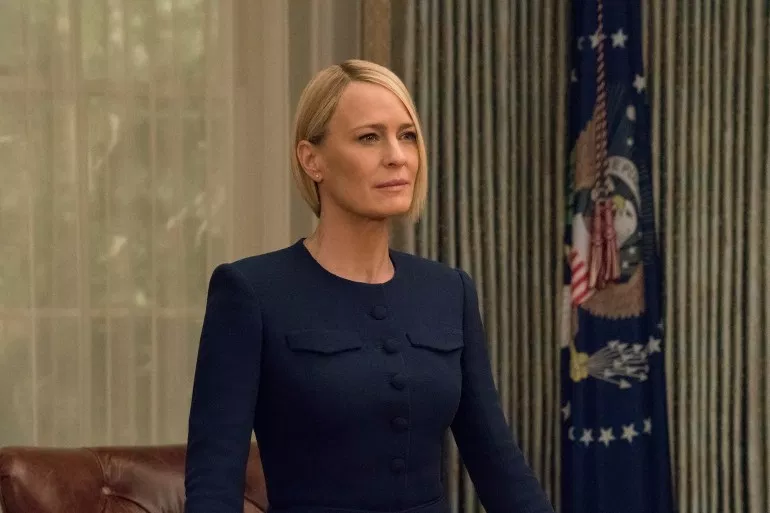Author’s note: Five of the eight episodes were provided by Netflix for review. The final season premieres Friday, November 2nd.
Netflix exploded into the mainstream with the launch of House of Cards in early 2013, providing star power in Kevin Spacey and Robin Wright and delivering a massive wave of prestige television to the age of streaming. How far television has come since then—as has this show, one lead gone and the other rising to take the rightful place. And life imitates art, with Wright’s Claire Underwood now President, ushering out the old for the new.
The show is haunted by the ghost of Frank Underwood, his moves over the previous sixty-five hours felt in every episode. The misdeeds, crimes, and outright murders still creep their way into Claire’s every waking moment, threatening to teeter over her presidency and take her with them. The knives are sharpened, from the shadowy Shepherd family who hold the strings to those in the past coming for their revenge. Claire has a lot of combatants to face, and it is a large fight to prove her worth as the first female President.
But with Wright at the forefront of the show now, House of Cards shines as it did in its early years. She is magnetic and empowering in her portrayal, no longer co-starring with Spacey but making the show hers. It still has the show’s feel of previous years, but there is a new energy this direction provides which was not there in the last few seasons.
Season Six does falter when it deals with holdover pieces of years past, with side investigations, certain characters not trusting one another from previous political moves, and one crazy plotline coming back in the form of a threat. There’s vast conspiracies, double and perhaps even triple crosses, secrets coming back, all at times to the detriment of the bigger story, when that bigger story is all the more interesting. When the show isn’t about Claire, it can come across as lacking. It’s all part of not quite being able to let go of the past and its roots, when the future is right there. That future is where this season works best, and shows its most improvement.
Wright is better than ever this year, as we catch more intimate glimpses into her mind than Frank’s viewpoint ever could have given. She is strategic in her performance by way of the story, given moments of strength and weakness as the enemies circle her even closer than before. It helps shine more light on Claire’s personality, and in this, Wright is able to push her arc far better than years before. She is a powerful performer, with such grace and command of the screen. She’s at the top of her game here, and the show is all the better with her in the lead.
Diane Lane and Greg Kinnear add to this season as a brother and sister team at play with higher machinations, but are perhaps, at times, a little too one-note; Lane has a good chemistry with Wright in their scenes together, a tit for tat back and forth which really works well. The returning cast are all still quite good, but can be held back by the aforementioned detours.
The production continues to be stellar, with stately homes and the White House sets all gorgeous to look at, and the score from Jeff Beal changed up from previous years, at least to my ears, shifting with the times to match Claire better. Melissa James Gibson and Frank Pugliese return as showrunners this season, and their work, along with the other writers, feels reinvigorated and with an energy the show had been lacking for some time.
For a show to become better again in its final year is both a blessing and a curse. This new potential could have been fun and well worth revisiting for another year. But all things must come to an end, and it’s a good note to end on. Claire Underwood’s presidency is a messy one, with the haunts of her past always at her back. But House of Cards still holds some magic up its sleeves, enough to provide excellent entertainment and an effective final season.


